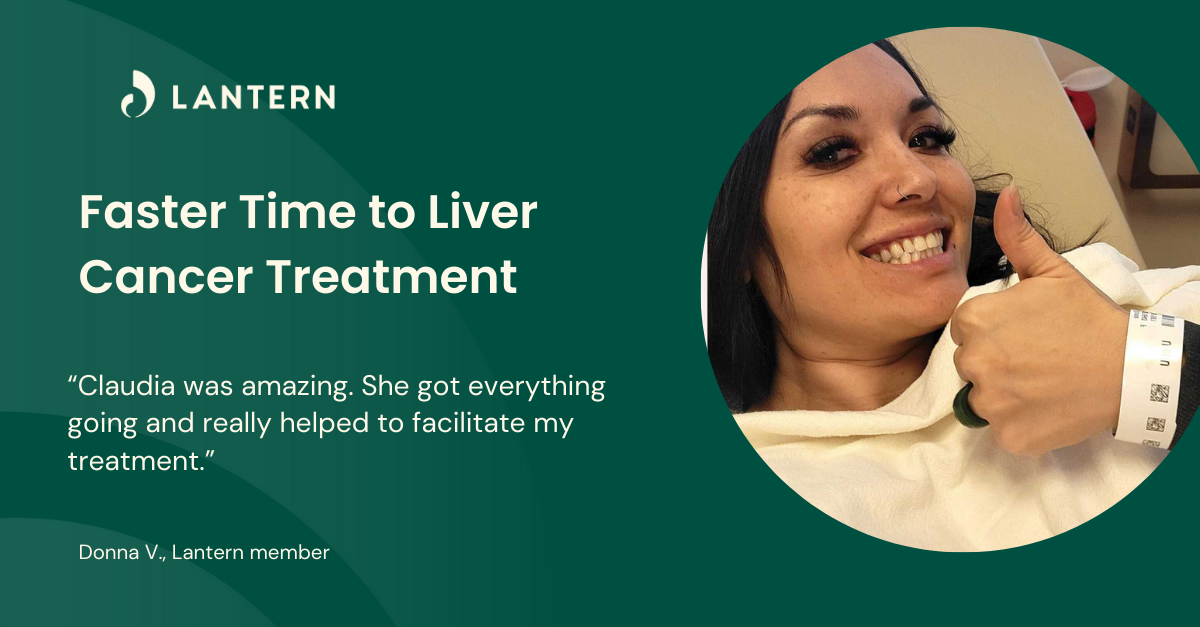Lantern member Donna V. began experiencing a sharp pain on her right side over the fall of 2023. The pain would surface out of nowhere, then disappear just as quickly. Thinking it was likely indigestion, Donna never gave it too much thought.
“Then one day I woke up and it hurt so badly I couldn’t get out of bed for two days,” Donna says. “I was like, ‘Obviously there’s something seriously wrong.’”
She went to a local walk-in clinic where an ultrasound didn’t reveal anything troubling. However, a follow-up MRI found a 10-centimeter mass on her liver.
“I was diagnosed with Stage 4 liver cancer, and then I found out it had spread to my lungs,” Donna says.
It was a shocking diagnosis for an otherwise healthy woman in her early 40s. Liver cancer most commonly affects people in the 65 to 74 age range, with the median age of diagnosis at 66.
Donna met with oncologists at Huntsman Cancer Institute in Salt Lake City, who recommended immunotherapy to attack the cancer. But before she could start treatment, she ran into approval issues with her insurance.
“We Were Able to Get the Result We Wanted”
With her treatment at a standstill, Donna began looking for other solutions. Her husband remembered he had access to a program called Lantern through his employee benefits, so they reached out for assistance.
Almost immediately, Donna says she connected with Claudia McClanahan, a certified oncology nurse.
Through Lantern, oncology nurses provide 1:1 guidance across the patient’s treatment plan, both from a clinical and psychological standpoint. Advocates help the patient understand their treatment options and goals, obtain a second opinion when necessary, manage side effects and navigate a complex healthcare system.
A member’s Nurse Navigator can also assess the patient’s treatment plan to ensure the patient receives the best care available from a reputable health center and follows the latest standard-of-care guidelines. While Donna was in good hands at Huntsman, a National Cancer Institute-designated center, she needed assistance with getting her treatment in motion.
“She needed two medications. One was approved, one was denied, so that was a serious delay of treatment,” Claudia says. “She’s a 40-year-old woman with Stage 4 liver cancer, so even a week can seem like forever when you have such a scary diagnosis.”
To help, Claudia reached out to the third-party administrator (TPA) managing pre-authorization for Donna’s insurance plan. She sent research-based studies as well as National Comprehensive Cancer Network (NCCN) guidelines showing the two-medication approach was the standard of care for treating Donna’s liver cancer.
“Ultimately, we were able to facilitate the approval process, and Donna was able to start treatment,” Claudia says.
“It Definitely Alleviates Some of Our Stressors”
After getting the green light, Donna says Claudia sprang into action, coordinating treatment between her doctors and oncologists, and communicating with her TPA. Donna says communication improved drastically between all parties thanks to Claudia’s advocacy.
“Claudia was amazing,” Donna says. “She got everything going and really helped to facilitate my treatment.”
Donna began regular infusion treatments in December. Every three weeks, she and her husband make the five-hour drive from their home in Nevada to Huntsman. To make the experience more comfortable, as part of the Lantern program, her husband’s employer covers her stay in a hotel close to the cancer center, and her Care Advocate books all of the rooms on their behalf.
Lantern also provides Donna with a debit card she can use to pay for fuel, food, and other expenses related to her treatment.
“It’s such a nice feeling having that extra support system—it definitely alleviates some of our stressors,” Donna says. “We haven’t had to pay for a hotel, and the hotel even provides breakfast. It’s really nice because cancer is expensive.”
A Promising Outlook for the Future
Now a few months into her immunotherapy, Donna says she feels hopeful about her treatment and the infusions have already made a positive impact on her cancer.
“They retested my tumor markers, and they went down by half, and that was just with my first two treatments,” Donna says.
She has another round of imaging scheduled for March, and depending on the results of the scan, her oncologists will determine whether to start targeted radiation.
Whatever the future holds, Donna feels grateful knowing Claudia will be with her every step of the way.
“She’s so empathetic,” Donna says. “I really can’t say enough good things about Claudia.”


